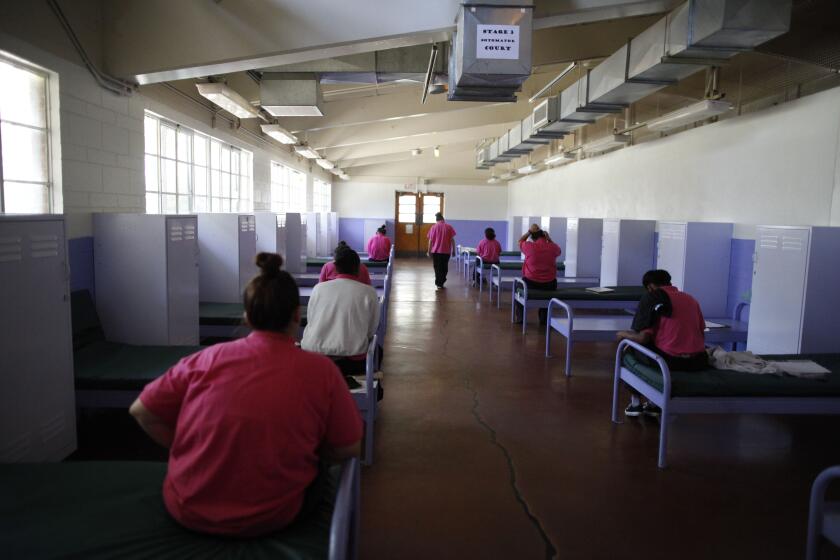Nearly a century after Upton Sinclair’s campaign, is California really ready to end poverty?

- Share via
SACRAMENTO — Nearly 90 years after activist writer Upton Sinclair launched the End Poverty in California campaign, an advisor to Gov. Gavin Newsom has released a similarly ambitious plan by the same name.
In a report released this week, former Stockton Mayor Michael Tubbs, known for his effort to push universal basic income, laid out a sweeping proposal to create a “minimum wealth floor” and overhaul the state’s social safety net with the launch of a new nonprofit, End Poverty in California, or EPIC.
The plan also calls for expansion of business and home loans, affordable housing, job benefits and decriminalization of “quality of life” offenses such as loitering and public camping.
But it’s unclear whether Californians will now be more welcoming to this EPIC campaign than those who heard Sinclair’s pitch decades ago, part of his unsuccessful but influential run for governor in 1934.
Despite the state’s national reputation as a liberal bastion — Democrats maintain a supermajority in both houses of the Legislature, and a Republican has not been elected statewide in almost 16 years — a number of recent proposals aimed at ending poverty and narrowing inequities have stalled in deep blue California.
Just last week, legislation to guarantee medical coverage to all Californians by levying billions in new taxes died in the Assembly without even a floor vote.
Voters in 2020 rejected ballot measures that would have imposed rent control, ended cash bail policies and reinstated affirmative action programs.
“A big part of the work at EPIC is to really call the question: With a Democratic Legislature, with a Democratic voting base and a Democratic governor, can we end poverty in California? And if not, why not?” Tubbs, Newsom’s economic mobility and opportunity advisor, said in an interview with The Times. “I’m very optimistic, but I harbor no illusions. We may have to kick and scream and push and disagree on the way there. It’s really about the appetite of the state.”
Tubbs’ 51-page policy paper, released with Stanford University, calls for an expansion of government assistance program eligibility, extending benefits to California residents without legal immigration status and adults without children.
California would probably have to use local and state funds because it is “shackled to federal rules and guidelines that treat these groups as undeserving,” according to the report.
The plan would eliminate requirements such as work mandates, asset tests and in-person interviews to prove eligibility for some social services programs, a process that Tubbs calls “intrusive and dignity-stripping.” The report recommends that the state create an integrated benefits system that automatically enrolls eligible Californians and shares data across programs that provide stipends for food and housing.
“There are tropes that people are poor because they don’t work hard enough or are lazy or make bad choices,” Tubbs said. “It’s not about individual choices — we can’t control those anyway — it’s about bad systems and bad policies that are exploitative and keep people poor.”
Tubbs said he didn’t intentionally name his new nonprofit after “The Jungle” author’s historic campaign, but said he’s inspired by it, pointing out that despite his gubernatorial defeat, Sinclair’s push for tax reform, pensions for the elderly and support for the unemployed helped inspire the New Deal enacted by President Franklin D. Roosevelt to spur economic relief during the Great Depression.
“A lot of those ideas actually became real policy because someone was imaginative and said, ‘We can end this,’” Tubbs said. “It’s a policy issue and a wider moral issue. How do we allow this?”
While Tubbs himself called parts of the plan daunting, state-funded “baby bonds” for children born into poverty — cash with no strings attached designed to close generational wealth gaps — could happen now with enough political will, he said, pointing to the state’s record-high budget and projected surplus.
That budget is driven by California’s progressive tax structure, weighted to rely on larger payments made by top earners who have felt little economic effect from the pandemic and, in some cases, have become wealthier. At the same time, California has the highest poverty rate of any state. More than a third of state residents “were poor or near poor” in 2019, according to a report by the nonpartisan Public Policy Institute of California.
Newsom became the first governor to direct state funding toward universal basic income pilot programs after Tubbs’ success in Stockton, and his budget proposes an expansion of Medi-Cal eligibility to all immigrants and billions to address homelessness.
But Newsom has warned against creating new, ongoing state programs with what could be temporary cash.
Tubbs, who called Newsom a “key supporter,” says now is the time for change, noting that the pandemic has put a spotlight on the importance of a safety net.
“There’s a very compelling argument that an eye towards the future means addressing this issue of poverty because poverty makes us weaker,” Tubbs said. “It’s bizarre that folks have done so well, and we have so many people who are homeless and can’t pay for necessities. With that incongruence, it’s hard to puff up our chests and say we’re so progressive and enlightened.”
Assemblymember Isaac Bryan (D-Los Angeles), the recipient of this year’s Upton Sinclair Award from the nonprofit Liberty Hill Foundation, said he worries that several current Democratic vacancies amid a historic exodus in the Legislature could mean less support for such social reform.
Tubbs’ movement, which will include “listening sessions” in communities experiencing poverty across the state, is crucial, he said.
“We’re never ready to do the bold things that we should’ve been doing. Sometimes it takes a small group of committed people who are ready, who can change the dynamic for everybody else,” Bryan said. “When it comes to economic inclusion, there’s always somebody on the other end of economic prosperity that stands to lose that perceived advantage. You’ve got to make sure those appeals to goodness are heard.”
More to Read
Sign up for Essential California
The most important California stories and recommendations in your inbox every morning.
You may occasionally receive promotional content from the Los Angeles Times.










